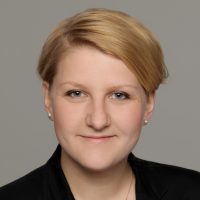Medvedev in Munich

Liana Fix
Council on Foreign Relations
Liana Fix is a fellow for Europe at the Council on Foreign Relations (CFR). She is a historian and political scientist, with expertise in German and European foreign and security policy, European security, transatlantic relations, Russia, and Eastern Europe. She is also the author of A New German Power? Germany’s Role in European Russia Policy (Palgrave Macmillan, 2021). Dr. Fix’s work focuses on German domestic and foreign policy, the European Union, transatlantic relations, and Europe’s relations with Russia and China.
Prior to joining CFR, Dr. Fix was program director for international affairs at Körber-Stiftung in Berlin. She was also a resident fellow at the German Marshall Fund in Washington, DC, and a DAAD/AICGS fellow at the American Institute for Contemporary German Studies. From 2018 to 2019, she was a fellow for global governance futures at the Robert Bosch Foundation Multilateral Dialogues. From 2014 to 2016, Dr. Fix was a doctoral fellow at the German Institute for International and Security Affairs and associate fellow at the German Council on Foreign Relations. From 2012 to 2013, Dr. Fix worked as a Mercator fellow for international affairs at the German Federal Foreign Office, the EU Delegation in Tbilisi, and the Carnegie Moscow Center.
Dr. Fix has contributed essays, policy papers, and articles to peer-reviewed journals including Foreign Affairs, Foreign Policy, and the Washington Quarterly, among others. She is also a frequent contributor to international and German-language media.
Dr. Fix received her MSc in theory and history of international relations from the London School of Economics and Political Science and her PhD in political science from the Justus Liebig University Giessen. She is a member of the European Leadership Network Younger Generation Leaders Network on Euro-Atlantic Security and of Women in International Security.
The appearances of Russian representatives at the Munich Security Conference are always eagerly awaited—from Putin’s anti-Western rambling in 2007 to Sergey Lavrov being laughed at last year: they always promise stuff to talk and worry about.
This year it was Prime Minister Medvedev’s turn. One of his most remarkable sentences—and there were many—was his denial of civilian casualties due to Russian bombing in Aleppo: “There is no evidence of our bombing civilians, even though everyone is accusing us of this.” The room (and Twitter) gasped at the audacity of this statement.
But there is a more fundamental truth underlying his statement: The Russian leadership does not see civilian suffering, because…it does not care. It never has. Russia has always conducted wars without any regard for human lives, be it in Chechnya, or under Stalin, who used masses of people as cannon fodder. People die in war, and that is normal. Human suffering only matters if it can be instrumentalized for propagandistic purposes, as has been the case with refugees and aid transports in eastern Ukraine.
One can dig deeper and cite a fundamental fatalism in the Russian mindset as reason: Wars happen, catastrophes happen and, in the best case, the bereaved are paid, and the issue is quickly “resolved.”
But it is not only that the Russian leadership does not care: It also does not believe that anyone else (in the West) cares. In its worldview, morals are just a cover to pursue interests, and in this case: to pursue Western interests in Syria, to pressure Russia to stop its advance on Aleppo.
The disregard for human casualties, for morality in politics, might be at first glance seen as a strength of Russian policy. If you do not care, you can just follow Shakespeare’s “as you like it.” But it is also a great weakness. As German foreign minister Frank-Walter Steinmeier stressed in an interview in the run-up to the Munich Security Conference: Morals are the guideline for politics. Otherwise, politics are erratic.
This miscalculation and underestimation of morals and values as (one of the) drivers and motivations of Western policy is also why Merkel’s refugee policy remains a huge riddle and question mark for many Russians. Why is she taking in so many refugees, undermining her power base, and—here many Russians would agree with Donald Trump—potentially risking a revolution? Even if it is not for the moral high ground, but out of an instrumental concern for the European Union, as some argued, why put European interests over national interests?
Merkel has surprised the Russian president already once, when she led the transatlantic community toward a common position against Russia’s actions in Ukraine. And with her quiet but persistent and stubborn battle for European unity in the refugee crisis, she might surprise the Russian president again.
Because this is what Medvedev’s appearance in Munich and his plea for renewed Euro-Atlantic cooperation has also shown: Even in the refugee crisis, Merkel is not at the mercy of Putin. Rather, Putin is at the mercy of Merkel: to loosen sanctions and to relieve the pressure on the Russian economy, which must be of paramount importance for the Russian leadership in the coming year until the next Munich Security Conference if it wants to avoid serious internal disturbances.








